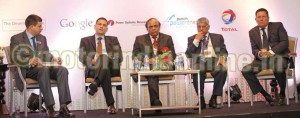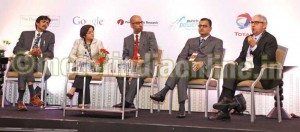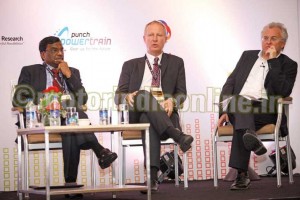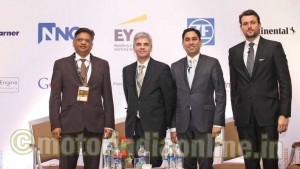
The fourth edition of the Automotive World Megatrends India Conference, held on February 25 and 26 at Chennai, threw light on the current bleak economic scenario in the country, which has had an enormous adverse impact on the automotive industry growth, with industry experts sharing their ideas and views on how to remain stable and profitable despite the tough times. However, the megatrends continue to indicate that the Indian automotive sector holds huge potential for growth in the long-term.
In the latest edition of the two-day conference, the focus was on commercial vehicles on day one and on passenger vehicles on the day two. The first day included four highly insightful panel discussions, starting with the heads from the vehicle OEM companies giving an outlook from the top of the value chain.

Mr. Marc Llistosella, CEO and Managing Director, Daimler India Commercial Vehicles, spoke about how his company has managed to make inroads into the truck market despite extremely challenging market conditions. He also stressed the need for a country-wide scrapping campaign to remove outdated trucks from the system and an independent vehicle certification which would ensure only qualified vehicles ply on the roads.
Mr. A. Ramasubramanian, President, AMW Motors Ltd., shared his opinion that the automotive industry was not going through a cycle at present but that it was a severe crisis which is ongoing for too long. He highlighted the need for better and faster development of road infrastructure to facilitate more efficient transportation across the country.

Mr. Ravi Pisharody, President, Commercial Vehicles Business Unit, Tata Motors, retraced how his company had set the tone for the CV industry decades back and how it continues to stay ahead of the pack by bringing out new models and variants, entering new segments, creating new value-propositions for the customers, etc.
Mr. Anders Grundströmer, Managing Director, Scania Commercial Vehicles India And Senior Vice President, Scania Group, had a slightly different point of view compared to his previous speakers who have all been battling the market recession for many months. Since Scania operates only in the premium segment of the market, the company has not been affected much by the market slump, though it had to tackle the slowdown in the mining segment which has shown good development in recent months. Mr. Grundströmer touched upon concepts such as modularization, sustainable transportation and alternative fuels for which Scania is known for globally.
The second session presented an interesting mix of various topics including a market outlook for the CV segment, growing trends in the manufacturing space, increasing use of infotronics in vehicles and more. Mr. Ross Simmons, General Manager (Sales/Technical), Alcoa Wheels Products, representing one of the oldest companies in existence among the ones in the conference, spoke about the advantages offered by aluminium wheels over the conventional stainless steel products.

Session three focused on sustainable transportation and developing engineering trends in the market and ended with Mr. Toby Peters, Founder & CEO, Dearman Engine, elaborating the concept of ‘liquid air’, a new cleaner and cheaper solution for transportation and refrigeration.
The last session was equally engrossing as the previous three, with Mr. Erich Nesselhauf, Vice President, Procurement & SCM, Daimler India Commercial Vehicles, emphasizing the need for efficient supplier monitoring to achieve success. Mr. Piyush Munot, Managing Director, ZF India Pvt. Ltd., and Mr. Philipp Bäcker, General Manager, BPW Trailer Systems India Pvt. Ltd., rounded off the proceedings, sharing their views as representatives of two of the leading tier I supplier names in the global automotive industry.